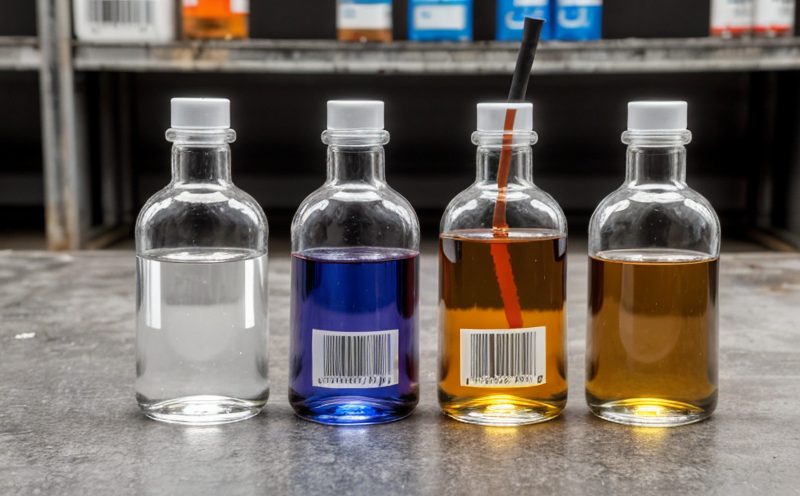ASTM D2272 Rotating Pressure Vessel Oxidation Stability Testing
The ASTM D2272 test method is a standardized procedure used to assess the oxidation stability of petroleum products, particularly diesel fuels and lubricants. This testing evaluates how susceptible these materials are to oxidative breakdown under high-temperature conditions within a controlled environment.
This method uses a rotating pressure vessel to simulate the effects of thermal stress on fuel or oil samples over time. The process involves placing a sample in a sealed vessel with oxygen, heating it to a specified temperature, and then rotating the vessel at a defined speed. This rotation simulates the movement of the fluid within an engine while it is being heated.
The test measures the weight loss of the sample over time as an indicator of its tendency towards oxidative degradation. By quantifying this degradation, ASTM D2272 provides valuable information about the quality and potential lifespan of fuels or lubricants under operational conditions.
Understanding the oxidation stability is crucial for ensuring product performance during storage and use, especially in environments where high temperatures could accelerate aging processes. This test helps manufacturers and researchers optimize formulations to improve fuel efficiency and reduce emissions by minimizing the formation of harmful compounds like polycyclic aromatic hydrocarbons (PAHs).
The ASTM D2272 rotating pressure vessel is a sophisticated piece of equipment designed specifically for this type of testing. It allows precise control over temperature, rotation speed, and exposure time—all factors that can significantly influence the results. This controlled environment ensures accurate measurement of oxidation rates without external variables affecting outcomes.
For quality managers and compliance officers, ASTM D2272 is essential for meeting regulatory standards such as those set out by the American Society for Testing and Materials (ASTM). By adhering to this standard, companies ensure their products meet industry benchmarks. This testing also supports R&D efforts aimed at developing more stable formulations that can withstand harsher conditions while maintaining optimal performance.
Engineers involved in fuel or lubricant research benefit greatly from ASTM D2272 as it provides critical data needed to design better-performing products. Procurement professionals will find this test particularly useful when evaluating suppliers' offerings, ensuring they are meeting quality expectations set forth by international standards like ASTM.
| Item | Description |
|---|---|
| Pure Sample | Absence of any additives or contamination. |
| Vessel Size | Specific dimensions to allow rotation without obstruction. |
Industry Applications
The ASTM D2272 test finds application across various industries where petroleum products play a critical role. For instance, in the automotive sector, it helps ensure that diesel fuel meets stringent emission control requirements. In industrial settings, lubricants must have excellent oxidation stability to extend their useful life and protect expensive machinery.
| Parameter | Description |
|---|---|
| Temperature Range | From ambient to 100°C, depending on the fuel type. |
| Vessel Rotation Speed | Typically between 50 and 70 rpm. |
In aviation, where fuels need to maintain their properties at high altitudes and low pressures, ASTM D2272 ensures that jet fuel remains stable enough for reliable engine operation. For marine applications, this test guarantees that diesel used onboard ships maintains its integrity during extended voyages.
Eurolab Advantages
As a leading provider of ASTM D2272 testing services, Eurolab offers several advantages to our clients. Our state-of-the-art laboratories are equipped with the latest technology and experienced personnel who understand both the theoretical aspects of this test as well as practical considerations.
We offer fast turnaround times without compromising on accuracy or precision. This means that you can get your results back quickly, allowing for timely decision-making regarding product development or supplier evaluations.
Our team provides expert advice throughout the testing process, helping ensure that every sample is prepared correctly and tested under optimal conditions. We also offer comprehensive reporting services that provide detailed insights into your product's performance according to ASTM D2272 standards.
International Acceptance and Recognition
The ASTM D2272 test is widely recognized internationally due to its rigorous methodology and consistent results. It has been adopted by numerous organizations around the world as a benchmark for evaluating the oxidation stability of petroleum products.
Inclusion in international standards such as ISO, ASTM, EN, IEC adds credibility to the results obtained from this testing method. Many countries have incorporated ASTM D2272 into their national regulations, further emphasizing its importance within the global petroleum industry.
By adhering to these internationally accepted protocols, manufacturers can ensure that they meet not only local but also global market requirements, enhancing their competitive position in international trade.





